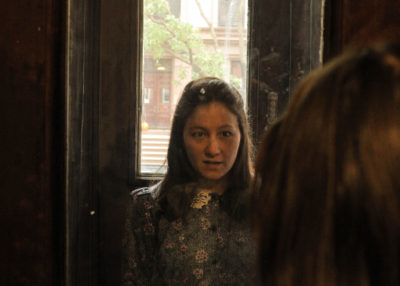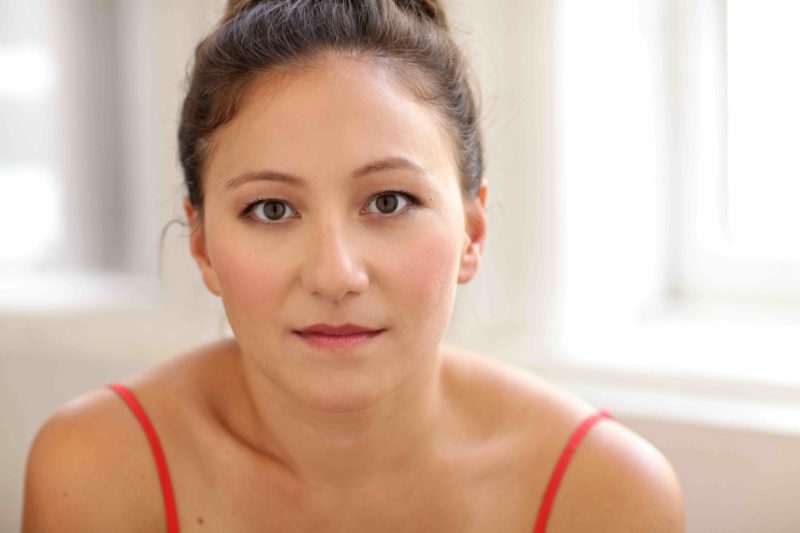INTERVIEW: ‘Sheila’ addresses paradox of female existence in the United States

Peregrine Heard and Lauren LaRocca, two artists from The Associates theater company, are currently bringing to life two dynamic, complex characters in the new play Sheila, which was collectively developed by The Associates and is directed by Jamal Abdunnasir. The play continues through Jan. 27 at the Jeffrey and Paula Gural Theatre at the A.R.T/New York Theatres in Midtown Manhattan.
Sheila takes place in September 1987 on the edge of a town in the middle of the country. In the play, Gloria opens the door to an unexpected visitor: a woman she hasn’t seen in 10 years. They converse about the haunting images they’ve had of each other, and they explore the silences that occurred for so many years. Press notes state that the women are not trying to conquer the world, but survive in it.
The Associates began developing the show a couple of years ago to address the representation of women on stage and the paradox of female existence in the United States. This twofold mission has only grown in strength and poignancy during the #MeToo movement and the recent discussions of gender equality, sexual harassment and women’s rights.
Recently, Hollywood Soapbox exchanged emails with Heard, artistic director of The Associates. She has appeared in Chuck Mee’s Soot & Spit, Piehole’s Ski End and Power Couple at Ars Nova. Questions and answers have been slightly edited for style.
What can audiences expect from Sheila?
Sheila is a nightmare vision of a woman’s life at the edge of town in the middle of the country. The world of the play staggers between the mundane and surreal, as two women grapple over the facts of their shared history and the fantasies for their future. We wanted to evoke both the intense intimacy of these women’s childhood friendship and the profound estrangement that could persist from one wrong turning.
The Associates trust our audience to enter the theater in the spirit of the scientist in the field, or the child at the campfire, or the drunken stranger lingering at the bar too late: There’s plenty to be curious about, and more than a little to stand your hair on end, so stay alert and you can fit the pieces together. Sheila contains a mystery — why did Gloria disappear 10 years ago, and why did she come back? — but the fabric of the play is a tightly-knit friendship that must bear the strain of long-suppressed revelations.
How does the writing work for a show like Sheila? Is it collaborative?
The Associates are five playwright-performers, and we are collective creators of our plays. For Sheila, we rehearsed once weekly for one and a half years to devise this story. The past six months have been dedicated to revising the script and rehearsing this production, under the direction of company member Jamal Abdunnasir.
In other words, after generating a heap of research and original material — characters, scenes, improvisations, images, speeches — the company stitches together a script in a group-editing process. We try to make decisions by consensus, and when we can’t do that, the strongest gut feeling usually prevails. This all works because we take a lot of time to experiment with the material on our feet, and scenes that begin as improvs usually go through several incarnations (and often several company member’s voices) before they enter the script.
With Sheila, we were making a feminist piece of theater, yet we, each of us, comes to the cause of feminism from a personal set of circumstances. How we created two singular characters from our five experiences — which include childhood, womanhood and manhood — was a process of weaving our present perspectives into a historical context and less cosmopolitan place, where feminism is much more an inexpressible feeling than a critical ideology.

What are some of the themes that you want the audience to consider during and after a performance?
We are interested in whether women can ever claim agency — or whether in fact there is no escape from the patriarchy. Is disappearing an escape? Is staying a bid for power? Gloria and Mary have taken different paths, which they see as modes of survival; however, we might consider them coping mechanisms, or even fixed and inescapable traps.
The choices that Gloria and Mary made, between the ages of 18 and 28, proceeded from life-changing yet statistically unremarkable circumstances. We meet Gloria on the precipice of another choice from which she cannot retreat, and she is asking a question that The Associates cannot ourselves answer: Would different choices have sprung her from these traps, or were they inevitable? Or, did Mary and Gloria ever have a fighting chance?
Has the show taken on a new light or a new urgency given the #MeToo movement?
Without question. The play was conceived during [Hillary] Clinton’s candidacy, when gender inequality seemed forbidding, to say the least. Today, as the surge of women’s stories continues to grow, there is ever more need to put women on stages of all kinds. We need to listen to women, study women, talk about what happens to women in our world. Mary and Gloria do not stand for every woman, but they share will all women the experience of taking a stand, making sacrifices and feeling the cost of their decisions. Even at the remove of several decades, these characters are the same women who are in doubt, disaffection and danger in America today.
What’s the overall mission of The Associates? Have you achieved your original goals?
We create stories at the intersection of our personal nightmares, cultural taboos and current political landscape, where differences among us become the engine of dramatic action. We mine paradox and ambiguity because we want to make theater that encourages critical thinking, self-reflection and compassion.
We aim to subvert the contract of theater, which ordinarily insulates audience from the world of the play, so that they can encounter sticky and strange ideas through new forms of dream logic and associative thinking. We are constantly working to reach these goals onstage — and we rely on our audiences to tell us how close we are coming.
For Sheila, there will be three post-show discussions (Jan. 18, 23 and 25) when we get the opportunity to hear what the play is stirring up. We need our audiences to fill in Mary and Gloria’s story with their own interpretations.
By John Soltes / Publisher / John@HollywoodSoapbox.com
Sheila is currently running through Jan. 27 at the Jeffrey and Paula Gural Theatre at the A.R.T/New York Theatres in Midtown Manhattan. Click here for more information and tickets.

